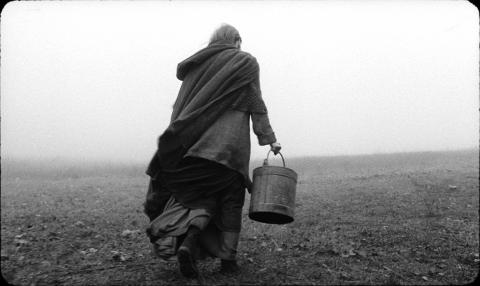As the country’s foremost cinema showcase, the Golden Horse Film Festival (台北金馬影展) has reached out to a younger demographic over the past few years and successfully transformed itself from an event of film screenings attended by serious cinephiles to a cultural feast that attracts diverse audiences.
To accommodate festivalgoers’ vastly different tastes and preferences, the 31st Golden Horse is showing even more movies under a bulging variety of categories and sub-categories. Nearly 200 feature, documentary, animation, short and experimental films are divided into 10 major segments, requiring a 267-page festival program. In light of the increasing difficulty of navigating through the festival’s dazzling programs, the Taipei Times offers a snapshot of what’s on offer.

Photo courtesy of Golden Horse Film Festival
Masters, new talents
Tickets are selling fast for the latest works by film maestros including Pedro Almodovar, Jean-Pierre and Luc Dardenne, Aki Kaurismaki and Gus Van Sant, which form the bulk of the festival’s annual focus on what is going on in the world of cinema. Among freshly recognized talent on the international film festival circuit, Belgian writer-director Michael Roskam delivers a compelling debut feature titled Bullhead, which looks at the shady Belgian beef industry through the eyes of a deeply troubled young man who embodies a macho persona by injecting increasingly large doses of testosterone into his body. Meanwhile, in his Cannes-winning Once Upon a Time in Anatolia, up-and-coming Turkish auteur Nuri Bilge Ceylan explores the human condition through a slow-moving story about police searching for a dead man in the eerie landscape of Anatolia. The first 90 minutes of the film are filled with seemingly insignificant conversations and no conventional action: Viewers, you have been warned.

Photo courtesy of Golden Horse Film Festival
Classical restored
Can any self-respecting film buff resist the urge to revisit digitally restored masterpieces such as A Clockwork Orange, Taxi Driver and La Dolce Vita? Among the timeless magna opera being screened in this section, Deep End is relatively unknown in Taiwan but often regarded as the finest work of Jerzy Skolimowski, a key figure of the Polish new wave movement that took shape during the 1960s. The sexually charged and darkly humorous work is said to cast insight into the sexuality of 1960s Britain as it follows a 15-year-old boy and his growing obsession with his co-worker at a bathhouse in London.

Photo courtesy of Golden Horse Film Festival
Director in focus
This year’s Golden Horse features five directors in focus, and for sophisticated viewers, Hungarian filmmaker Bela Tarr’s filmic world offers a lot to study and write papers about (he is adored by the likes of Susan Sontag and Jim Jarmusch). Shot in high-contrast black-and-white, his latest work, The Turin Horse, leisurely unfolds over the course of six days and allows audiences to spend the entire two and half hours contemplating the mundane routines of a father and his grown-up daughter living on a modest farm. Tarr’s 1994 Satans’ Tango promises to offer a viewing experience like no other, as the much-revered epic lasts over seven hours and relates the story of a group of collective farm residents in an unnamed country whose communist regime is collapsing.
Women’s voices
The presence of women is significantly pronounced this year, with a lot of movies addressing women’s issues and experiences and/or made by female filmmakers. Lebanese writer-director Nadine Labaki muses on how to stop inter-religious conflicts in Where Do We Go Now? in which the women in a remote village inhabited by both Muslims and Christians try to keep their men from starting a religious war, with strategies that include staging a fake miracle, drugging the men, and hiring a troop of strippers. On a more bitter note, Scottish director Lynn Ramsay’s We Need to Talk About Kevin offers a bleak look at the title teen’s killing spree through the memory of his mother, played by the brilliant Tilda Swinton.
LGBT highlights
Several Cannes and Berlin International Film Festival-winning films with LGBT themes show off various kinds of love and desire, including Beauty, in which a closeted married man falls under the spell of a friend’s son, and Absent, which tells of a forbidden relationship between a swimming coach and his adolescent student. The program on Israeli documentary maker Tomer Heymann displays four of his acclaimed works including Paper Dolls, which follows the lives of five Philippine transvestites working illegally in Israel, and The Queen Has No Crown, a meditation on the director’s Israeli family in a sociopolitical setting.
Midnight movies
The Wonderland section is where festivalgoers can find things weird, outrageous and X-rated. Underwater Love, the latest film by renowned pink film (a type of sexploitation cinema unique to Japan) director Shinji Imaoka, is a love story between a 35-year-old factory worker and a kappa, a part-man, part-beast mythical creature from Japanese folklore.
Billed as the first adult animated feature after the fall of the communist regime in Poland in 1989, George the Hedgehog is a raucous, hilarious piece featuring a skateboarding hedgehog that can sit comfortably side-by-side with works like South Park.
Apart from the more than 300 film screenings, featured directors such as Tarr, Heymann, Aoyama Shinji, Lee Chang-dong and Sylvia Chang (張艾嘉) will hold lectures. For more information, visit the event’s Web site at www.goldenhorse.org.tw.

In the March 9 edition of the Taipei Times a piece by Ninon Godefroy ran with the headine “The quiet, gentle rhythm of Taiwan.” It started with the line “Taiwan is a small, humble place. There is no Eiffel Tower, no pyramids — no singular attraction that draws the world’s attention.” I laughed out loud at that. This was out of no disrespect for the author or the piece, which made some interesting analogies and good points about how both Din Tai Fung’s and Taiwan Semiconductor Manufacturing Co’s (TSMC, 台積電) meticulous attention to detail and quality are not quite up to

April 21 to April 27 Hsieh Er’s (謝娥) political fortunes were rising fast after she got out of jail and joined the Chinese Nationalist Party (KMT) in December 1945. Not only did she hold key positions in various committees, she was elected the only woman on the Taipei City Council and headed to Nanjing in 1946 as the sole Taiwanese female representative to the National Constituent Assembly. With the support of first lady Soong May-ling (宋美齡), she started the Taipei Women’s Association and Taiwan Provincial Women’s Association, where she

Chinese Nationalist Party (KMT) Chairman Eric Chu (朱立倫) hatched a bold plan to charge forward and seize the initiative when he held a protest in front of the Taipei City Prosecutors’ Office. Though risky, because illegal, its success would help tackle at least six problems facing both himself and the KMT. What he did not see coming was Taipei Mayor Chiang Wan-an (將萬安) tripping him up out of the gate. In spite of Chu being the most consequential and successful KMT chairman since the early 2010s — arguably saving the party from financial ruin and restoring its electoral viability —

It is one of the more remarkable facts of Taiwan history that it was never occupied or claimed by any of the numerous kingdoms of southern China — Han or otherwise — that lay just across the water from it. None of their brilliant ministers ever discovered that Taiwan was a “core interest” of the state whose annexation was “inevitable.” As Paul Kua notes in an excellent monograph laying out how the Portuguese gave Taiwan the name “Formosa,” the first Europeans to express an interest in occupying Taiwan were the Spanish. Tonio Andrade in his seminal work, How Taiwan Became Chinese,